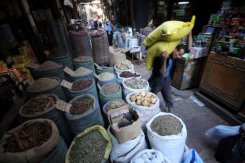
Egyptian agriculture minister blamed Israel for contaminated fenugreek seeds from Egypt that killed dozens in Europe
Egypt denies responsibility for E. coli contamination
Released on - Wednesday,06 July , 2011 -21:01
 Cairo denied responsibility on Wednesday for E. coli outbreaks that killed 49 people in France and Germany and were blamed by the European Union on fenugreek seeds imported from Egypt.
Cairo denied responsibility on Wednesday for E. coli outbreaks that killed 49 people in France and Germany and were blamed by the European Union on fenugreek seeds imported from Egypt.
The Egyptian agriculture ministry said the incriminated lot was imported as dried seeds in 2009 and argued that the bacteria could not have survived for so long.
"Lot no. 48088 had been exported on November 2009 as dried seeds. Scientifically, the bacteria cannot remain on this dry surface from 2009 till June 2011," the ministry said.
The contamination of fenugreek sprouts "could be related to different handling processes as the re-packing or water used for sprouting," the statement added.
On Tuesday, the European Food Safety Agency (EFSA) singled out the lot imported to Germany as "the most likely common link between the two outbreaks" but added that subsequent imports could also be implicated.
The European Union then slapped a temporary ban on all seeds and beans from Egypt based on the EFSA's findings.
"The report published today leads us to the withdrawing of some Egyptian seeds from the EU market and to a temporary ban on imports of all seeds and beans originating from that country," EU health commissioner John Dalli said.
In addition to the deaths, the outbreaks have affected 4,178 people in the EU, Norway and Switzerland.
Withdrawal of the suspect seeds implies not only a ban on their sale but also their destruction.
The temporary import ban, to be enforced until October 31, hits all Egyptian seeds, fruit and spores used for sowing -- including soya beans, dried leguminous vegetables and oil seeds.
Russia also decided Wednesday to halt imports of some seeds from Egypt.
The Egyptian agriculture ministry stressed that the E. coli strain has not been reported in Egypt.

No comments:
Post a Comment